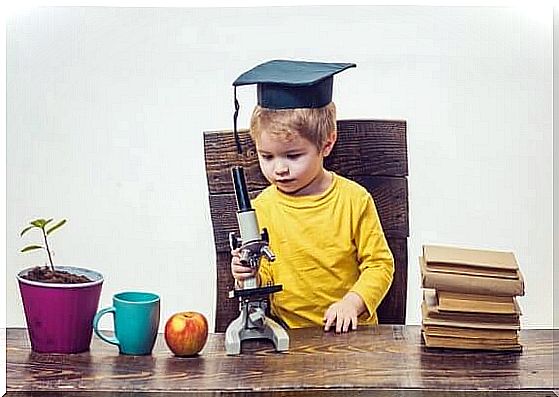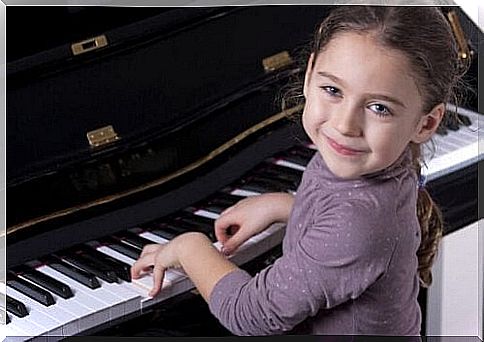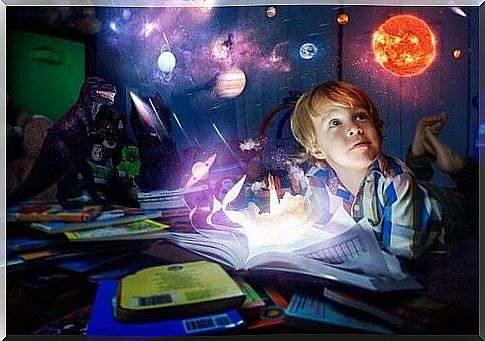How To Recognize A Gifted Child
To recognize a gifted child or one who has great intellectual capacities, it is necessary to call on specialists. However, it is possible to detect important signs that allow parents to recognize them and give them maximum support.

A gifted child has a different way of being, of understanding and of processing information. His high intellectual capacities can cause incomprehension in those around him.
It is often considered that a child who performs well in school or who is able to acquire many and various skills early on is a gifted child. However, this is not always the case.
To be considered gifted, children must adequately develop their gifts and other talents so that they can develop their full potential, for their own benefit and also for that of society. But above all, in order to be able to be happy. On this point, parents play an essential role in detecting whether their child is a gifted child.
What does it mean to be a gifted child?
When a child has great intellectual capacities, it is more and more common to think that he is gifted; in this context, the notions of talent and intellectual precocity are included.
To simplify the concept and make it more understandable, a gifted child is said to have an IQ of 130 or greater.
To be a gifted child means to benefit from an exceptional nature far superior to all areas and aptitudes of intelligence. A child with very good grades at school, artistic or athletic talent, or even with a high precocity to learn or speak, is not necessarily gifted.
How do we know if we have a gifted child?

For many parents, having a child different from others is difficult. Understanding that he is a child who, despite all your efforts, will not react or behave according to the pattern established by the average child of his age, is a challenge.
In fact, a gifted child can also have a very difficult childhood since he receives a lot more information and stimuli than he can assimilate. The world around him may seem incomprehensible, slow, or even hostile to his abilities.
It is therefore essential that parents guarantee the development and happiness of a gifted child. For this, it is possible to detect some fundamental characteristics within the home.
Intellectual precocity
A gifted child will acquire intellectual or psychomotor landmarks early on. They are very demanding babies, who stimulate themselves easily.
They raise their heads from the first month of life, articulate two different sounds after the first 45 days, pronounce their first words before the age of one… In the same way, they speak before their two years or write before other children of their age .
These are children who master a precise, rich and very broad vocabulary for their age. They have a prodigious memory, both short term and long term. They learn very quickly and show curiosity to learn more and more.
Emotional and sensory hypersensitivity
A gifted child is very intense emotionally and sensory. This emotional intensity puzzles parents, who do not understand this excess of emotion in their reactions.
He is a child who has a low tolerance for frustration and has a tendency to have huge temper tantrums. He overreacts to a sad or horror movie and also shows great empathy towards others. It is not uncommon for a gifted child to suffer from depression and anxiety.
Little is known and much less understood about sensory hypersensitivity. Gifted children are embarrassed by clothing etiquette, loud sounds, intense lights …
Strong creativity
A gifted child is very creative because he perceives reality differently. He is very imaginative. As sensory perception is higher in him than in others, he has many ideas and finds solutions to the problems he encounters.
Gifted children challenge authority and standards if they are not argued and meaningless to them. They are usually very good at finding a solution. But even more to ask questions that will leave their parents unanswered. From an early age, they are preoccupied with existential themes such as life, death, the existence of God, and love.
These children have a predilection for cognitive games, such as puzzles or puzzles. And they also opt for construction games that impose ever more complex challenges.
Psychomotor hypersensitivity
These are children who are in constant motion. They are bursting with energy and are difficult to exhaust. They are enthusiastic and need to be physically or cognitively active.
It is very common for them to be wrongly diagnosed with Attention Deficit Hyperactivity Disorder (ADHD). And this because boredom leads them to concentrate their excess energy in the movement.
However, they are very far from having attention problems. On the contrary, they have a high capacity for concentration when performing a task that interests them.
Evolutionary Dyssynchrony

This term is used by psychologists to describe an uneven course in development. Children with high abilities may be preoccupied with existential themes and at the same time react with inordinate anger at the loss of a toy.
It can also happen that the gifted child wants to put into practice things that he has thought and imagined, but that he cannot because his level of motor skills does not allow him to do it at his age. We are therefore faced with children who evolve faster in the intellectual field than in other fields, such as the emotional field or the motor field. This therefore causes them great frustrations and a feeling of helplessness.
How to educate a gifted child?
The education system does not always have the capacity to meet the demands of these children, who are seen as a burden or a problem. This can cause them to fail, both personally and academically.
Raising a gifted child is not easy, since it is a child with a complex temperament: he is absent-minded, self-critical, perfectionist and competitive, with a great sense of independence. Therefore, he needs his family and teaching staff not to be overly rigid, and to be willing to stimulate his development.
To find out if your child has great abilities, you need a comprehensive assessment by experts. This should include intelligence quotient, creativity, life history and emotional state.
Beyond what the result of the assessment says, estimate the enormous potential that a gifted child possesses. It is far from being a problem, on the contrary: it is a blessing.









